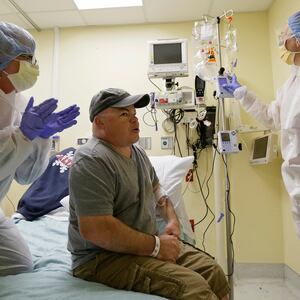A Chinese scientist rocked the science and medical worlds this weekend by claiming he had been able to edit genes so that twin baby girls were born resistant to HIV.
But far from being lauded for the purported breakthrough using the gene-editing tool CRISPR, He Jiankui is in a whole lot of trouble—accused of going rogue to perform experiments that invoke the spectre of eugenics.
Within hours of the announcement, He had been suspended without pay from the Southern University of Science and Technology in Shenzhen and was under investigation by the Shenzhen City Medical Ethics Expert Board, according to the MIT Technology Review.
The ethics board released a statement saying that HarMoniCare Shenzhen Women and Children’s Hospital, the private hospital that reportedly helped support his work, had “never conducted the appropriate reporting according to requirements.” The former medical director of HarMoniCare, Jiang Su-Qi, told the local Southern Capital News that he did not remember ever approving He’s work while on the hospital’s ethics committee.
The MIT Technology Review first broke the news that He was recruiting couples to create the world’s first gene-edited babies. He led a team that focused on eliminating the gene CCR5, a protein that acts as a vehicle for the HIV virus in gaining access to cells. In doing so, he hoped to make the resulting babies resistant to certain illnesses
The Associated Press then reported that seven couples were involved, and that the twin girls born last month were the world’s first genetically edited babies.
He’s team used CRISPR to deactivate CCR5 in several embryos, according to the AP report. Six were later implanted into mothers through in vitro fertilization; all the fathers were HIV-positive. Deactivating the gene in the embryo would, in theory, reduce the embryo’s risk of carrying the HIV virus.
Scientists and ethicists were quick to sound warnings about He’s work. While some medical ethicists have praised gene editing technology like CRISPR as a path by which genetic disease could be eradicated, others fear it could put science on a slippery slope.
“These two children are the guinea pigs. They will go through their whole maturing process having not understood the risks ahead of time,” Liu Ying, from Peking University’s Institute of Molecular Medicine, said.
But He defended his research, saying that his goal was not to cure or prevent disease, but to “bestow” the trait of HIV-resistance, a genetic predisposition only a few people naturally possess.
“I understand my work should be controversial, but families need this technology, and I am willing to take the criticism,” He said.







